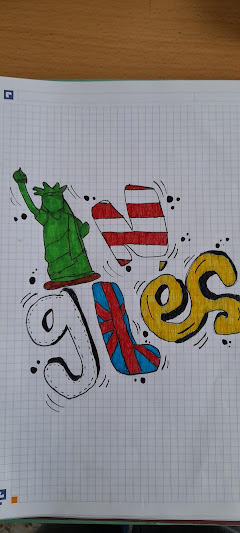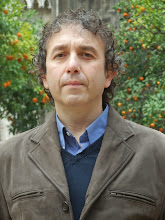Project made by Gema García on A Description Of My Home.
martes, 13 de diciembre de 2016
miércoles, 23 de noviembre de 2016
WINNERS OF THE COMPETITION: 'DESIGN YOUR T-SHIRT'
martes, 22 de noviembre de 2016
Description of my Home
Productions made by Gema García and Ana Camacho on Description of my Home. (IES V Centenario - Sevilla).
martes, 8 de noviembre de 2016
martes, 25 de octubre de 2016
An Informative Essay (Selectividad)
domingo, 23 de octubre de 2016
WORD ORDER: STRUCTURE of the ENGLISH SENTENCE
WORD
ORDER: STRUCTURE of the ENGLISH SENTENCE
WORD ORDER is very important in English, the
usual order being:
Subject + Verb + COMPLEMENTS
(Indirect + Direct + How / Where / When)
He writes her a letter. We drove carefully to
Bristol. I have breakfast in the morning.
1) If a sentence has got both a DIRECT and an
INDERECT object, there are two possibilities:
I gave HER a present / I gave A PRESENT to her
2) Time expressions come at the end of the
sentence, or at the BEGINNING separated by COMMA:
He plays the piano every Thursday / Every
Thursday, he plays the piano
3) Never separate the verb from the object(s):
He PLAYS every Thursday THE PIANO WRONG
4) Adverbs of MANNER can come in many
positions, but not between the verb and the object:
She
opened the door SLOWLY / SLOWLY, She opened the door / She SLOWLY opened the
door / She opened SLOWLY the door WRONG
5) ALWAYS and NEVER cannot begin or end a
sentence:
ALWAYS she walks to school WRONG /
She walks to school NEVER WRONG
6) Adverbs of FREQUENCY and TIME EXPRESSIONS
have special rules:
FREQUENCY ADVERBS
USUALLY
OFTEN
SOMETIMES
SELDOM
RARELY
HARDLY EVER
NEVER (EVER)
They must be one single word (except hardly ever).
They are adverbs showing how often
the action of the verb is fulfilled.
They usually present three different positions:
1) If the sentence has a simple verb it
goes between subject and verb:
I usually eat at three o’clock. They never eat
meat
2) If the sentence has a compound verb
it goes between the first verb and the second one:
I can never remember his name. She has never
been to London
3) If the sentence has AM, ARE, IS,
WERE or WAS (NOT will be) it goes after them:
You are never on time. She is always late.
(BUT: I will always be yours)
TIME EXPRESSIONS
EVERY DAY / WEEK / MONTH / YEAR…
ONCE / TWICE / THREE
TIMES… PER / A
DAY / WEEK / MONTH / YEAR…
ON (DAY OF THE WEEK in plural) MONDAYS /
WEDNESDAYS…
They are time phrases (adverbials).
They are placed either at the
beginning (with commas) or the end of the sentence since they have more than
one single word:
On Saturdays, I go swimming
Every month, we go to the dentist’s
We play tennis twice a week
PASSIVE VOICE
PASSIVE
VOICE
ACTIVE: Subject + Verb +
Object (Direct / Indirect)
PASSIVE: Patient Subject + Verb + BY Agent
APPROPRIATE
FORM OF TO BE + PAST PARTICIPLE
Peter writes a book ------------------------------
A book is written by Peter
- VERBAL TENSES:PRESENT SIMPLE PASSIVE:ACTIVE: Bank robbers generally wear masksPASSIVE: Masks are generally worn by bank robbersMasks are not generally worn by bank robbersAre masks generally worn by bank robbers?PAST SIMPLE PASSIVE:ACTIVE: The judge sentenced the murderer to prisonPASSIVE: The murderer was sentenced to prison by the judgeThe murderer was not sentenced to prison by the judgeWas the murderer sentenced to prison by the judge?FUTURE SIMPLE PASSIVE:ACTIVE: Parliament will pass a new lawPASSIVE: A new law will be passed by ParliamentA new law will not be passed by ParliamentWill a new law be passed by Parliament?PRESENT PERFECT SIMPLE PASSIVE:ACTIVE: The police have caught the prisonerPASSIVE: The prisoner has been caught by the policeThe prisoner has not been caught by the policeHas the prisoner been caught by the pólicePAST PERFECT SIMPLE PASSIVE:ACTIVE: The pickpocket had stolen the walletPASSIVE: The wallet had been stolen by the pickpocketThe wallet had not been stolen by the pickpocketHad the wallet been stolen by the pickpocket?PRESENT SIMPLE CONTINUOUS PASSIVE:ACTIVE: The police are searching every carPASSIVE: Every car is being searched by the policeEvery car is not being searched by the policeIs every car being searched by the pólice?PAST SIMPLE CONTINUOUS PASSIVE:ACTIVE: The police were watching the housePASSIVE: The house was being watched by the policeThe house was not being watched by the policeWas the house being watched by the pólice?PASSIVE GERUND:None of the other Continuous Passive forms are used, but notice the Passive Gerund which looks like a continuous form. Also, when two objects are employed, only one passive is produced.ACTIVE: I remember the thief taking my walletPASSIVE: I remember my wallet being taken by the thief
- AUXILIARIES PASSIVE:MUSTACTIVE: You mustn't park your car herePASSIVE: Your car mustn't be parked hereMAYACTIVE: The fog may delay the trainsPASSIVE: The trains may be delayed by the fogSHOULDACTIVE: You should give him a bookPASSIVE: He should be given a book / A book should be given to himMIGHTACTIVE: He might pass his testPASSIVE: The test might be passed by himCANACTIVE: Violent behaviour can cause many problemsPASSIVE: Many problems can be used by violent behaviourCOULDACTIVE: The police couldn't catch the criminalPASSIVE: The criminal couldn't be caught by the policeOUGHT TACTIVE: People ought to obey traffic lightsPASSIVE: Traffic lights ought to be obeyed by peopleHAVE TOACTIVE: Parents have to control their childrenPASSIVE: Children ought to be controlled by their parentsNEED TOACTIVE: I need to mend my carPASSIVE: My car needs to be mendedUSED TOACTIVE: I used to write booksPASSIVE: Books used to be written by me
- PAST PARTICIPLES used as ADJECTIVES within PASSIVE VOICEShe is worried about her familyHe is interested in his job
- INTRODUCTORY IT (PASIVA REFLEJA)We use the Passive Construction with certain verbs such as BELIEVE, CONSIDER, THINK, EXPECT, FEEL, FIND, GUESS, KNOW, SAY, TELL, UNDERSTAND, etc after the introduction of Impersonal IT.ACTIVE: They say that John is very richPASSIVE: It is said that John is very richACTIVE: They thought that the boy painted the wallPASSIVE: It was thought that the boy painted the wallBut a PASSIVE with an INFINITIVE CONSTRUCTION is more common:PASSIVE: John is said to be very richPASSIVE: The boy was thought to have painted the wall
- USES
- When the agent (the person doing the action) is unknown or needn't to be specified, it is usually omitted in the passive.ACTIVE: Someone stole my handbag yesterdayPASSIVE: My handbag was stolen yesterday
- If a sentence has both Indirect and Direct Object, it is possible to have two passive forms.ACTIVE: I gave Mary a bookPASSIVE: Mary was given a book / A book was given to Mary
- When the agent is known but the action seems more important than the person who does it, the agent, if mentioned, is placed after the subject and verb preceded by BY.ACTIVE: A gunman shot my friend last weekPASSIVE: My friend was shot by a gunman last week
- If the action is done by SOMETHING rather than SOMEONE, other prepositions may be used (WITH, IN,… )ACTIVE: This key can lock the doorPASSIVE: The door can be locked WITH this keyACTIVE: The food contained arsenicPASSIVE: Arsenic was contained IN the foodCAUSATIVE CONSTRUCTIONThe verb TO HAVE (or TO GET) and the Past Participle of the main verb can be used when someone has the action done by another person instead of doing it himself.
- A kind of passive construction
- Instead of TO BE we employ TO HAVE (it is also possible with TO GET)
- TO HAVE is in the same tense than the Active sentence
- The Lexical verb is In Past Participle
- The Object is between HAVE / GET and the Past Participle
- The Agent Complement is usually omitted
- The subject is called BENEFICIARYACTIVE: Subject + Verb + Object (Direct / Indirect)PASSIVE: Beneficiary Subject + APPROPRIATE FORM OF TO HAVE / TO GET + OBJECT + PAST PARTICIPLE + (BY Agent)We have painted the house -------------------------- We have had / got our house paintedEXAMPLES:I have had / got a house built on the beach (by someone).Susan has / gets her flat cleaned twice a week (by someone).I will have / get a book bought tomorrow.He has / gets his alarm tested every year.They will have had / got their TV repaired by Saturday
- As the passive with TO BE, the Causative Construction can be used with Auxiliary verbs
- You ought to have had / got the ladder repaired
- She may have had / got her dress modified
Suscribirse a:
Comentarios (Atom)


















